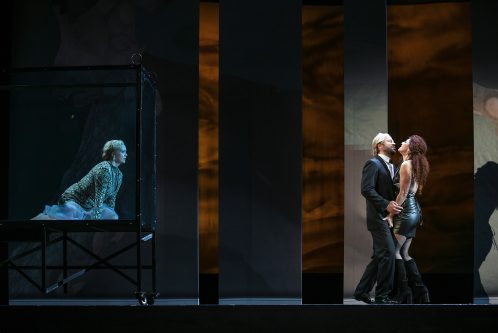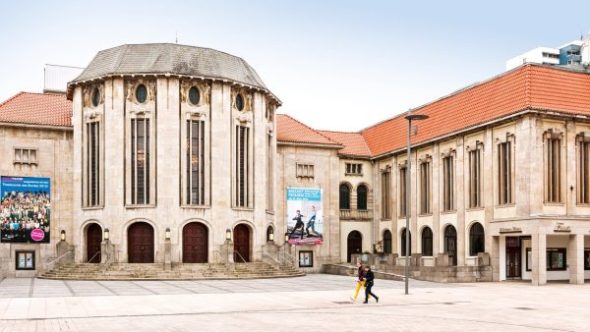 Germany Dvořák, Rusalka: Soloists, Chorus of the Stadttheater Bremerhaven, Philharmonic Orchestra Bremerhaven / Marc Niemann (conductor). Stadttheater Bremerhaven, 25.12.2023. (DMD)
Germany Dvořák, Rusalka: Soloists, Chorus of the Stadttheater Bremerhaven, Philharmonic Orchestra Bremerhaven / Marc Niemann (conductor). Stadttheater Bremerhaven, 25.12.2023. (DMD)

Production:
Director – Johannes Pölzgutter
Set and Costumes – Michael Lindner
Lighting – Thomas Güldenberg, Katharina Konopka
Dramaturgy – Markus Tatzig
Chorus director – Mario El Fakih Hernández
Cast:
Rusalka – Signe Heiberg
Prince – Konstantinos Klironomos
Ježibaba – Boshana Milkov
Vodník (Water goblin) – Ulrich Burdack
Foreign Princess – Julia Mintzer
Game keeper / Hunter – Marcin Hutek
Kitchen boy / First Wood nymph – Victoria Kunze
Second Wood nymph – Minji Kim
Third Wood nymph – Maria Rosenbusch
Water nymphs, water sprites, sea maidens, wood nymphs — creatures of fairy tales. Humans are the creatures of the real world. Only if seen from the human perspective, though! As if by necessity, by an unwritten and unspoken human rule, the world of a fairy tale clashes with the world of human ‘real life’. In this production, the world of the title heroine, Rusalka, water, is not necessarily that of the fairy tale, but it is certainly different from the world of humans. This clash of two worlds is at the centre of Johannes Pölzgutter’s production of Rusalka. To establish and develop that clash, each of the worlds is depicted with considerable detail of nuances, as is their interaction.
The vast empty stage represents the world of the lake, with a cyclorama at the back against which the predominantly black and white seascape is projected. The wood nymphs wear aquamarine-colour dress, draped in long white gauze shawls. The water sprite (also referred to in some texts as water goblin) appears in a costume inspired by conventional descriptions of the Vodník. The gauzes of the nymphs are projected onto the cyclorama when the humans sense and are frightened by the inhabitants of the lake.
Set off against that unlimited world of the water is the human world, clearly defined by architecture. It is created on a relatively narrow raised platform, leaving some space at the front to the orchestra pit and a lot of space to the back defined by the cyclorama. The platform first appears on the left hand of the stage, reaching out of the wings only for a third of the stage, in primitive shape to depict the abode of the Ježibaba, the witch. She is surrounded by three metal buckets, from which she takes some offal to eat, a knife, or the rope to help raise Rusalka to her feet. Later the platform extends further and further from left to right to depict more and the more of the human world. The back wall of that human world on the platform is created in such a way that the view of the cyclorama is not obscured, only increasingly reduced, until at some point a backdrop is lowered from the fly tower to completely obscure the world of the lake. From that point onwards, the water world is represented in the human world by a fish tank, without water, from which water creature turned kind-of-human Rusalka at one point poignantly observes the Prince with the Foreign Princess.
Rusalka wants to enter the human world to obtain a soul, to be able to love and be loved by the Prince. She is seriously warned against that wish, and it is only through the actions of a witch, a feared outsider, that she can change in such a way that interaction between her and the human world becomes possible. However, the transition is not complete. As if anything done by the representative of evil, Ježibaba, could possibly lead to happiness of any kind!
After her transformation, Rusalka is not a conventional human being. She does not get used to walking on human legs, and she dresses inappropriately, wearing the same kind of costume worn by Ježibaba (!). She is talked about by the common people, represented by the Kitchen Boy and the Hunter, accordingly. She does not bring the Prince what he wanted from a woman/wife and does not find in the Prince what she had naively hoped for. All these nuances, and many become clear in the details character presentation characteristic of this production.
Under conductor Marc Niemann, the orchestra depicts the two worlds of the lake and the humans with their distinctive differences and characteristics contained in the score. The differences are very clear; the transitions of one to the other are smooth and organic. In their occasional overlap in particular, both remain distinctly audible without the soundscape becoming muddled. Particular praise must go to Sabine Jacobs-Janssen (harp) and Carmineluigi Amabile (flute). Niemann was key in the decision to present the opera in its original Czech language and demonstrated a keen awareness of the specifically bohemian nature of the rhythms.

This year must be special for soprano Signe Heiberg: the title role in Rusalka comes after the title role in Tosca, with leads in The Merry Widow and Der Rosenkavalier to follow. This is her third season at the Stadttheater Bremerhaven — audiences should count themselves lucky to hear such a voice at their theatre! It is even more remarkable to note the development of the voice from, say, Giulietta in The Tales of Hoffmann via Agathe (Der Freischütz), Lady Macbeth and Tosca to Rusalka. Heiberg excels both in gentle and dramatic passages, and has become equally at ease and, most important, consistent, across the registers and pitches. She has developed the control necessary for such a large and great voice to shine and impress throughout. Her acting skills match the voice: she clearly enjoys bringing out the different colours of the character, ranging from childishly naïve via confused to deeply sad.
Konstantinos Klironomos was certainly Heiberg’s match as the Prince. His singing was nuanced, ardent, tender, or impetuous, mirroring the feelings he equally convincingly and suitably portrayed in his acting. His voice was focused, ringing, burnished, not very baritonal (as is characteristic of Jonas Kaufmann, for example) – it reminded me of mid-career Giacomo Aragall.
The production did not only focus on the protagonists, though! Attention to detail in characterisation, both in acting and singing, was given in equal measure to the remainder of the cast. Boshana Milkov sang Ježibaba with a warmly rich lower register and ringing top notes. She relished playing the witch as in her own world, unlike that of the creatures of the lake and humans — understanding both worlds to some extent, and interacting with both, but certainly not part of them.
Ulrich Burdack donned a costume inspired by descriptions and depictions of the Vodník, the water sprite or water goblin specifically in Slavic mythology. His bass was in a specific way suitably light, making it very melodious (rather than the heavyweight bass voice that may sound more impressive for individual notes, but where the effort of lifting the weight of the voice is to the detriment of the melody). Julia Mintzer sang the Foreign Princess) and in the court society of suits and evening dresses she stood out, wearing a leather outfit with fur jacket; her behaviour matched that outfit. Just as Rusalka, she did not fit in with the court environment. Many of the character’s lines come across as aggressive and are composed accordingly. It is to Mintzer’s credit that appropriate vocal characterisation did not come at the expense of tonal beauty. She was able to express the Foreign Princess’s anger with vocal nuance and consistency. Baritone Marcin Hutek sang both the Game Keeper and the Hunter. He brought an element of comedy to both, especially when the Hunter scares the Kitchen Boy by skinning a rabbit he has just caught. His voice was flexible and warm, with a firm core. Victoria Kunze sang one of the water sprites and the kitchen boy. A lively and committed actor, and a good dancer as well, her voice was bright, secure across the full range, with ringing top notes. Minji Kim and Maria Rosenbusch, members of the opera chorus, appeared as the second and third water sprite, respectively, adding their dancing skills to those of their lovely singing.
Daniel Meyer-Dinkgräfe
Featured image: Stadttheater Bremerhaven
